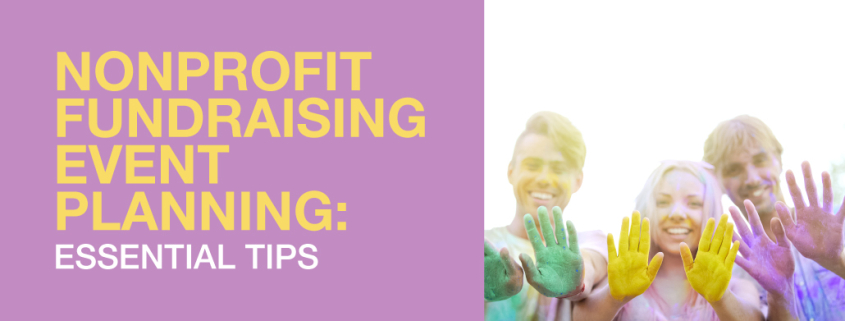Nonprofit Fundraising Event Planning: 4 Essential Tips
Whether you’re fundraising for a new program or securing funds for your capital campaign, events are essential for nonprofit fundraising. However, with over 1.5 million nonprofit organizations registered in the U.S. alone, your organization must set itself apart from others through its events.
We’ve put together this guide to help you plan a nonprofit fundraising event sure to thrill attendees and encourage their generous support. Whether you’re planning an in-person, virtual, or hybrid event, you’ll benefit from these best practices.
1. Create a memorable experience.
Most nonprofits aim to create a memorable event experience, but that’s much easier said than done. Here are our suggestions for doing so:
- Send personalized invitations. Set your event apart by sending visually appealing invitations through direct mail and email. To cut down on costs, you can design a special eCard invitation that potential attendees can open to simulate the feeling of receiving a physical invitation. Be sure to include the RSVP link or QR code directly in the invitation.
- Prioritize inclusivity and accessibility: Ensure all attendees can make the most out of their experience by approaching the event with universal design in mind. This means making your event accessible to all, such as through adding subtitles to visual and video elements, ensuring that your venue is accessible for mobility-challenged attendees, providing allergen-free food and non-alcoholic drink options, and more.
Ultimately, the key to making your event memorable is offering a high-quality and unique experience. Start by ensuring that your event is high-quality, meaning well-organized and entertaining. Then, consider what sets your nonprofit apart from all the others, and use that to jump into the rest of your event planning. Ensure that your event’s activities reflect your mission and cause to create an immersive experience for your donors.
2. Flesh out your budget with sponsorships.
If you’re interested in planning an event that’s outside of your nonprofit’s budget or just want to save your hard-earned funds, reach out to potential sponsors ahead of time to see if they’d be willing to financially support your event. Since you’re likely planning your event well in advance of the actual date, this will give you time to downsize your activities should you not acquire the requested funds.
When it comes to contacting potential sponsors, start with the following organizations:
- Local businesses
- Charitable-minded corporations
- Other nonprofits
Many smaller nonprofits struggle with sponsorship outreach due to a lack of know-how. If your nonprofit shares this struggle, Elevate recommends fundraising books as a top learning resource. With the right books, you’ll learn how to harness the power of sponsorships and other forms of major giving for your mission.
3. Leverage event technology.
While it’s possible to run an event without using much technology, many tools exist to simplify your event planning and event activities. Maximize your fundraising and take work off your team members’ plates with these tools:
- Event management solutions. Offer convenient online registration and ticketing to simplify sign-up. Plus, you can use these solutions to communicate with attendees before and after the event with reminders of tasks to complete and “thank you for attending” messages.
- Mobile event apps. For larger fundraising events, attendees can benefit from downloading a mobile event app. Include information about specific activities, your event schedule, and an event map to ensure attendees can participate in the activities they want to.
- Marketing tools. Promote your event through various communication channels, such as email, text messages, social media, and more. The right solution will also empower you to manage all your marketing efforts simultaneously so you can develop a cohesive marketing plan to attract potential attendees.
- Virtual event platforms. If your event is virtual or hybrid, a virtual event platform will streamline the attendee experience. These tools allow you to livestream your event, create breakout rooms for mini discussion groups, add virtual exhibits, and more so attendees don’t feel that they’re missing out on an in-person experience.
If you’re unsure which tech tools to purchase for your event, consider booking an appointment with a fundraising event consultant. These experienced professionals will help you decide which solutions will work best for your nonprofit and your event’s unique needs.
4. Learn from past fundraising events.
According to MemberClicks, you need to gather and assess attendee feedback to create even better fundraising events in the future. The best way to do this is with a post-event survey sent through email to all event attendees. Through these, you’ll glean critical insights from your attendees and can steward your supporters toward increased involvement.
Your survey might include the following questions:
- On a scale of 1-5, please rate your experience at our event.
- What did you most enjoy about our event?
- What did you least enjoy about our event?
- How did you hear about our event?
- What improvements can we make to improve our future events?
- On a scale of 1-5, please rate how likely you’d be to attend our future events.
You may also include event-specific questions. For example, if your event is hybrid or virtual, you can ask attendees how easy your virtual event was to attend and if they feel that they would have enjoyed an in-person event better. Allow your event attendees to type their responses to key questions, instead of merely using a multiple-choice format.
Once the survey results are in, carefully assess them for common complaints or popular suggestions. Address these in your next event to provide a more positive event experience and spark continued engagement. Plus, this will show supporters that you value their opinions and are genuinely interested in hosting great events for them.
Organizing and hosting a stellar fundraising event is no easy feat, especially when you consider that it needs to be unique and memorable. However, it’s not beyond your nonprofit’s reach to achieve this goal. With our tips, you’ll be well on your way to planning a fundraising event that inspires generosity in all your attendees.




